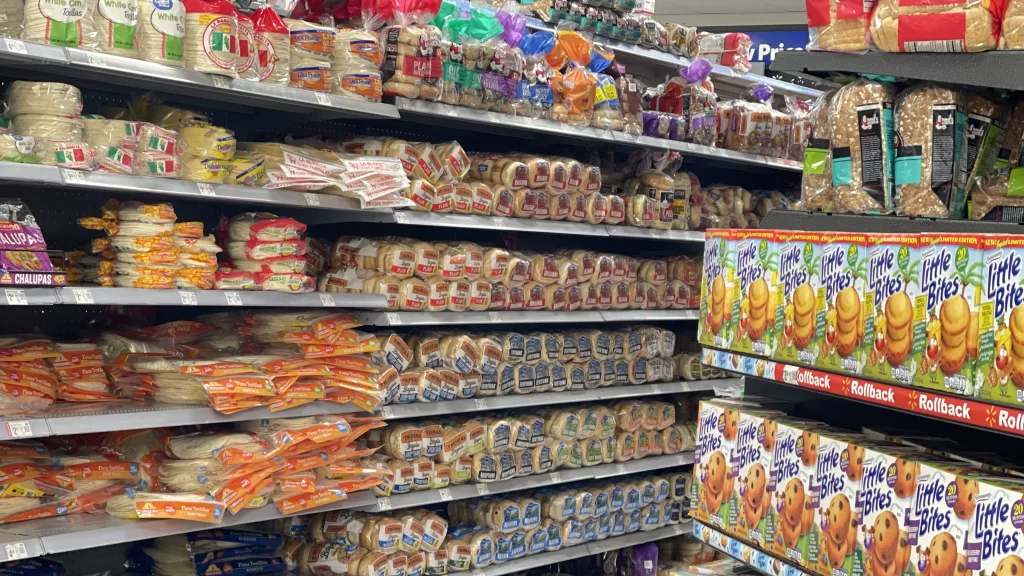AUSTIN, TX – In a first-of-its-kind effort, the Texas legislature has passed a bill to require warning labels on foods such as Mountain Dew and white bread that contain certain artificial additives and dyes.
The measure, now awaiting action by Republican Gov. Greg Abbott, would require a warning label prominently displayed on foods containing any of 44 artificial dyes and additives — a mandate that would apply to popular foods from Doritos and Skittles to Toaster Strudels and breads made with bleached flour.
It marks the first time a state, rather than the federal government, has tried to put its own warning labels on food.
While the bill passed the Texas House and Senate with bipartisan support, its sponsors are eagerly tying it to U.S. Health and Human Services Secretary Robert F. Kennedy Jr.’s “Make America Healthy Again” movement.
“This is about the MAHA parents and the crunchy granola parents coming together to say we are sick and tired of being sick and tired,” state Rep. Lacey Hull, who partnered with fellow Republican state Sen. Lois Kolkhorst to sponsor the bill, told legislators before the House voted on May 25.
“I have personally spoken to the White House, who said they are looking to us, to Texas, to get this done, to stand for our children and for our future,” Hull said.
Abbott has not yet said whether he will sign the bill. It also includes other statewide health mandates, such as expanding physical activity requirements in public schools and setting new nutrition education requirements for high school and higher education students.
But the food warning label has drawn the most attention.
The label would read: “WARNING: This product contains an ingredient that is not recommended for human consumption by the appropriate authority in Australia, Canada, the European Union, or the United Kingdom.”
Critics of food dyes and additives say they are most often found in low-nutrient, ultra-processed foods that promote unhealthy eating habits and contribute to chronic diseases like obesity and diabetes.
Some artificial dyes that are permitted by the U.S. Food and Drug Administration for use in foods are not recommended by its counterparts in other Western countries. European Union regulators require warning labels on some foods containing synthetic dyes, saying they may have an adverse effect on children’s activity and attention. In January, the FDA banned the artificial coloring Red No. 3, which is used in many foods and drinks in the U.S. but has been linked to cancer in animals. California became the first state to ban its use in 2023. That bill was sponsored by a Democrat and goes into effect in 2027.
But in Texas, the snack industry is pushing back. A coalition of dozens of food industry and business groups — including Walmart, General Mills and Coca-Cola — wrote a letter in opposition to the Texas bill’s warning label provision, saying it “casts an incredibly wide net” and goes too far.
“Texans deserve honest labeling; but they also deserve public policy that’s been studied, vetted, and evaluated for health considerations as well as economic impacts,” the organizations said in a letter circulated around the Texas legislature ahead of the House vote in May.
Yet opposition from some of the country’s largest food manufacturers may not be enough to halt the MAHA train.
The legislation with the labeling requirement joins other Republican-sponsored bills in the Texas legislature and around the country that reflect Kennedy’s MAHA agenda, from ending the addition of fluoride to public waters systems to loosening vaccine restrictions.
In March, West Virginia became the first state to pass a sweeping ban on synthetic food dyes. At least two dozen other states considered similar food dye bans in this most recent legislative session, according to data from the Environmental Working Group, a research and advocacy group that pushes for removal of chemicals from food and consumer products.
At the federal level, the FDA under Kennedy’s direction has also asked the food industry to phase out certain synthetic dyes by the end of 2026, though some of the largest companies have said the timeline may not be feasible.
Stateline reporter Anna Claire Vollers can be reached at avollers@stateline.org.
This article was first published by Stateline, part of States Newsroom, a nonprofit news network supported by grants and a coalition of donors as a 501c(3) public charity. Stateline maintains editorial independence. Contact Editor Scott S. Greenberger for questions: info@stateline.org.
Washington State Standard is part of States Newsroom, a nonprofit news network supported by grants and a coalition of donors as a 501c(3) public charity. Washington State Standard maintains editorial independence. Contact Editor Bill Lucia for questions: info@washingtonstatestandard.com.





